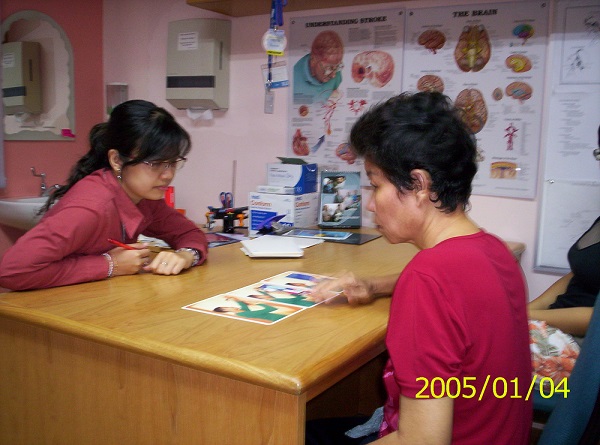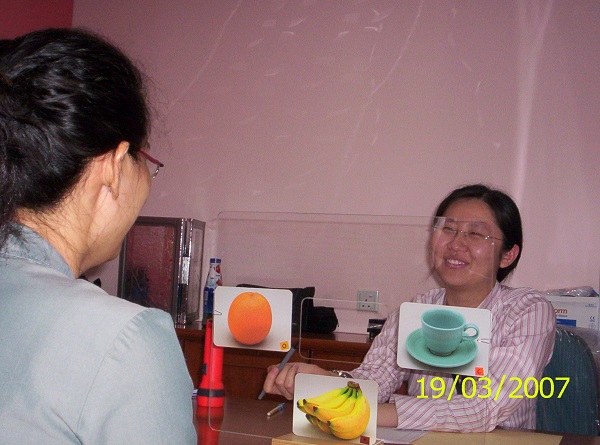Introduction
“Cannot speak” often reported by family members of individuals after stroke. This problem causes the individual who had a stroke failed to communicate properly. However, it can be restored with speech and language therapy and get help and support from family members.
What is the medical term for “Cannot Speak”?
Many people describe it in an easy language as “Cannot Speak”. But in medical terms it is known as APHASIA.
What is aphasia?
Aphasia is a language disorder in which a person lost the ability whether one or more skills of understanding the language use the language to communicate as well as read and write. However, intellectual of patients with aphasia are not affected. Patients still can think and be aware of their surroundings.
What causes aphasia?
The main cause of aphasia is stroke (25-40 % of stroke patients will suffer from aphasia). However, aphasia can also be caused by illness or damage / injury to the brain that controls language. These include serious injury resulting from an accident in the brain, brain tumours, infections of the brain and nervous diseases.
Who will suffer from aphasia?
Aphasia often occurs among adults (15% of adults aged less than 65 years reported having aphasia and a percentage of 43 % increase for individuals aged 85 years and over). , However, it can happen to all ages, races, nationalities and gender depends on the health problems faced such as diabetes, high blood pressure, heart disease and so on.
Types of aphasia?
Aphasia is a complex language disorders. This is because the types of aphasia are categorized according to the location of the injury / damage to the brain. The impact of aphasia on every individual is different. Aphasia is often categorized into three types, namely:
- Type 1 – problems with understanding of speech
-
This person can hear what is being said to him but did not understand the meaning of a word is heard.
-
If the problem is getting worse, what it sounds as if such a state of trying to understand a foreign language.
-
To respond to what they hear, these individuals can speak fluently but sentences produced have no meanings. (e.g. Go fish market to buy water brother motorbikes)
-
Errors generated during speech production by individuals with aphasia of this type were unnoticed.
-
Be able to understand some of the information based on the situation, the tone of voice, facial expressions and gestures but real word heard sounds like a jumble of sound.
-
A person who is less affected may be able to understand short and brief conversation but hard to follow long conversation even though still be able to combine words to form short sentences.
-
-
Type 2 – problems with word finding and combine them into sentences
-
Individuals who suffer from aphasia can understand what they hear but have difficulty in choosing the right words.
-
Feeling confused with the words that are in the group / the same category e.g. “seat” to “table” or may be confused with the words that have similar sounds, such as “book ‘to’ nail ‘.
-
In the case of a mild or moderately severe, these individuals may be able to generate the key word in the sentence but failed to generate word of support (as in, a, to). For example, “My rice ‘to’ I want to eat rice.”
-
Errors generate an incomplete sentence utterances are realized by individuals on their own and make it easily frustrated and depressed with their abilities.
-
Individuals who suffer from this type of aphasia may also have a problem to understand complex sentences.
-
- Type 3 – problems with both understanding and words finding
- It is the most severe aphasia.
- Individuals who experience this type of aphasia may have little or no understanding or producing speech.
- Aphasia of this kind is also known as GLOBAL
What other issues that they might experience?
Aphasia can affect all aspects of the language. The ability to read and write for individuals suffering from aphasia may also be reduced. Some individuals can lose this ability entirely. Spell a word or form sentences can also be a problem. Understand numbers, counting and dealing with money is also difficult. Understand and express abstract ideas and complex may also be impossible.
Can an individual who suffers from aphasia without physical paralysis?
Yes, but most patients with aphasia may experience weakness / paralysis in the right hand and leg. Patients who have aphasia are usually caused by damage to the left side of the brain that controls body movement to the right.
Can people who suffer from aphasia return to work?
It depends on the severity of aphasia and physical paralysis that the patient has. If the work requires them to communicate with customers, it is quite difficult. Individuals with mild and moderate aphasia may be re-employed in either the first job or find a new job. However, the work must be carried out according to their ability.
How aphasia affects a person’s life?
Aphasia affects the quality of life of individuals suffering from aphasia entirely in terms of relationships, work, finances, and social activities and so on. Simple activities such as going to the shops, using public transport, watching television and using the phone will become difficult or impossible if aphasia is accompanied by paralysis of the limbs. Individuals with aphasia will feel isolated when they cannot participate in daily conversations or communications.
In addition to affecting the quality of life of the individual, it also affects the quality of life of the family members. The lives routine and communication of family members who suffer from aphasia have been changed to meet the needs of individuals with aphasia. Thereby, the support and the help of family members are necessary to maintain the quality of life on both sides.
How long does it take to recover from aphasia?
Aphasia can recovers with rehabilitation within the first 6 months after the experience. However, it depends on:
- The number of stroke / brain injury: an individual who suffered a stroke more than once may take a long time to recover
- The location of brain injury
- Size of injury in the brain: the greater the injury / damage to the brain , the more experienced severe aphasia
- Age: the older, the slow recovery
- Early rehabilitation: the beginning of recovery will speed up the recovery process
- Motivate patients: high motivation impact of rapid recovery
- Motivation of family members: family support strong and sustained increase patient motivation and speed up the recovery process.


Speech Therapy Session for Patient with Aphasia
Source: KKM Speech Therapy Unit Archive
Where individuals suffering from aphasia can get rehabilitation?
Speech- language therapists are trained in the profession treating individuals suffering from aphasia. Care provided by speech-language therapist is different according to the type and severity of aphasia. Speech-language therapist will help individuals suffering from aphasia and family members to communicate in a simple manner through certain techniques.
Individuals who suffer from aphasia can also help recovery by engaging in a stroke support group like NASAM (National Stroke Association of Malaysia). Participation in support groups stroke. This allows individuals to share experiences and learn new things from other people who are experiencing the same problem. In addition, family members and caregivers also received support to participate in this support group.
References
- Parr, S., Pound, C, Byng, S. & Long, B. (1999). The Aphasia Handbook. Connect Press.
- Parr, S. Byng, S. Gilpin, S. & Ireland, C. (1997). Talking About Aphasia: Living with Loss of Language after Stroke. Open University Press.
- www.aphasia.org
- www.nasam.org
- http://www.medicinenet.com/aphasia/page2.htm#who_has_aphasia
| Last Reviewed | : | 28 August 2020 |
| Writer / Translator | : | Mohd Azmarul bin A Aziz |
| Accreditor | : | Fairus bt. Mukhtar |
| Reviewer | : | Nadwah bt. Onwi |







